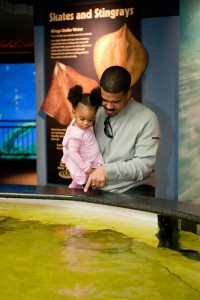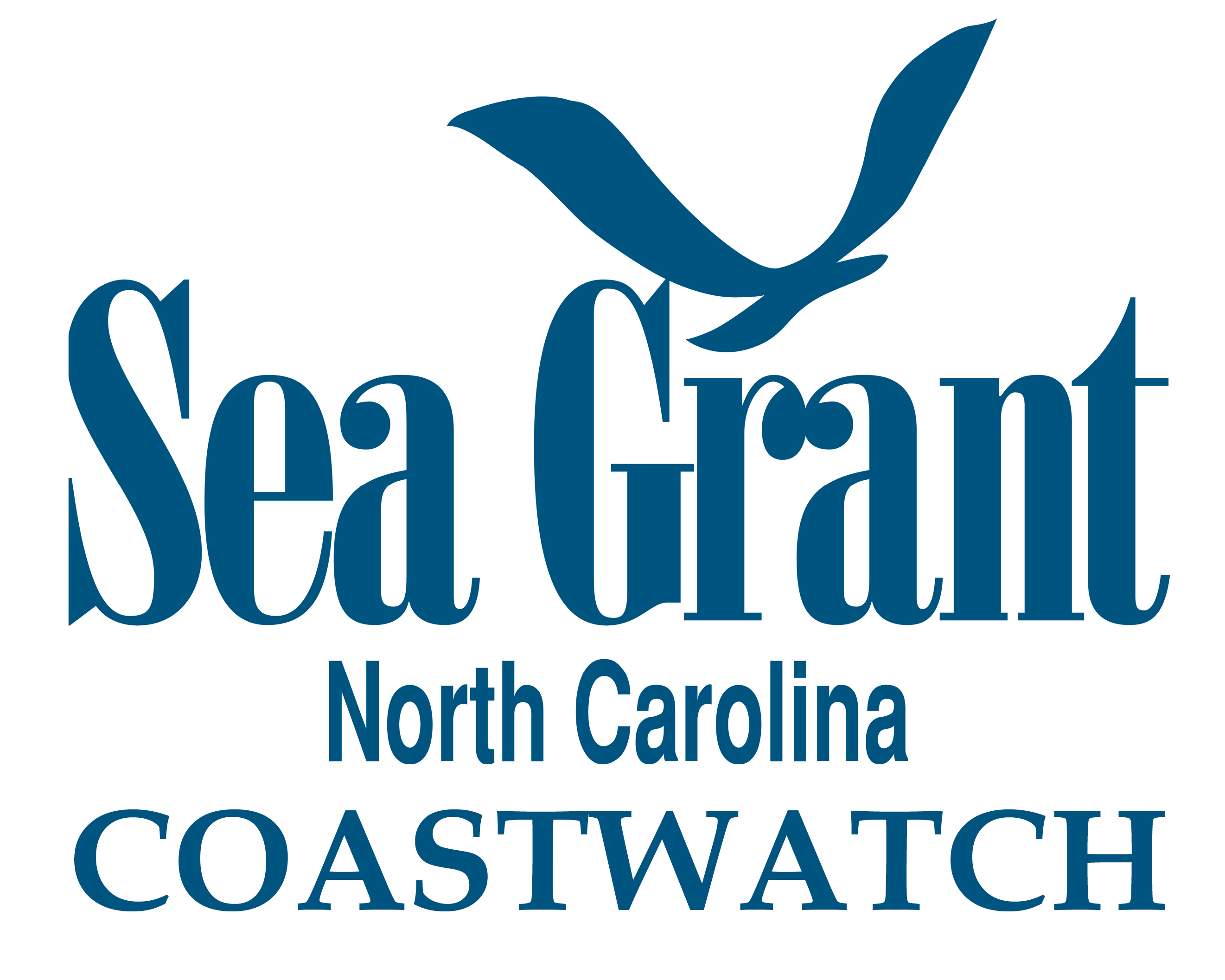By RYAN SHALLEY
A toddler reaches into the touch pool tank at the North Carolina Aquarium at Fort Fisher and encounters a starfish for the first time. A young boy takes a tour of artifacts from the famous ship Queen Anne’s Revenge, and imagines being Blackbeard’s first mate on the seven seas. A little girl spends her day saving mermaids in the ocean while on a fishing boat at the Children at Play Museum.
Early awareness of coastal education through aquariums, museums and parks along the coast is making learning fun for children and their parents.
“It’s so important to reach children at a young age so their senses of discovery, of exploration, of curiosity start developing early on. I can’t imagine what my own life — and education — would have been like if I hadn’t been exposed to nature, to wildlife, to exploring the outdoors when I was very young,” says Terri Kirby Hathaway, marine education specialist for North Carolina Sea Grant.
Opportunities vary in subject and target ages. Programs include parent-child activities, summer science camps, live performances and special traveling exhibits. Learning through play is a key approach in teaching young children.
For example, the North Carolina Aquarium at Fort Fisher has summer camps divided by age range. Aquanauts (ages 5 to 6) learn through animal interaction and play, while Marine Detectives (ages 7 to 9) use investigative skills in outdoor programs and interactive games.
“The N.C. Aquarium at Fort Fisher has a commitment to inspire appreciation and conservation of North Carolina’s aquatic environments through education,” says Peggy Sloan, the facility’s director and former education curator. “It is critical for students to be aware of North Carolina’s natural places, and to understand their value.”

Parents can help children discover sea creatures at North Carolina aquariums. Photo courtesy N.C. Aquariums.
But children can also learn through stories. The young — and young at heart — love a good pirate yarn and there are plenty along the coast.
The N.C. Maritime Museum in Beaufort houses artifacts from Blackbeard’s Queen Anne’s Revenge. The preschool programs offer coastal stories and crafts. Featured summer science programs for elementary-age children teach about boating, marine life and coastal history.
Allison Besch, education curator, says the Maritime Museum lets children experience coastal issues firsthand. “A trek through the salt marsh introduces us to coastal plants and animals. Students of all ages can build and sail traditional wooden boats made from local materials. They can walk the beach at Cape Lookout National Seashore where a young sperm whale came ashore in 2004,” she explains.
Roanoke Island Festival Park in Manteo focuses on the first English settlement in North America. The park offers live performances and summer camps that help young children learn about the unique environment of the Outer Banks — often through interaction with coastal flora and fauna.
For example: a summer camp centers on the Outer Banks’ natural resources. “The half-day Outdoor Adventure Camp will be offered to five- and six-year-olds and will focus on oysters, birds, small animals, crabs and wind power,” says Kathleen McLean, education and interpretation manager.
The Museum of Coastal Carolina, located in Ocean Isle, strives to stimulate interest and understanding of the region’s natural science, environment and cultural history. Just a block from the ocean, the museum teaches youngsters through hands-on opportunities with hermit crabs, starfish and sea turtles.
The Children at Play Museum is a recent addition to the coastal environmental education spectrum. Reflecting its founding concept — that children need a place to play and explore while learning about the coast — the museum features unique aspects of the Outer Banks.
Board member Liv Cook hopes that the museum can make science less intimidating for children and parents.
“If parents aren’t ‘scientists,’ they often don’t believe that they can teach their children science. I want to make sure parents know that science is in every aspect of life and that if they are cooking, singing, or even just talking with their children, they are doing something scientific,” she notes. “And I especially want young kids to be excited about science.”
In particular, Cook wants to convey the importance of local natural resources to all children. “We want conservation concepts to be common thought in our young people.”
As much fun as these interactive museums are, their hands-on exhibits must be carefully designed to help children learn.
“Educating young children — infants, toddlers, preschoolers — isn’t as easy as one might think,” Kirby Hathaway says. “I used to think that a preschooler is just a smaller, younger elementary student, but young children learn in different ways. Educators of young children need to plan and develop learning environments that support and nurture the process of learning about the environment, rather than learning facts,” she adds.
And that could work for kids of all ages.
Learning Opportunities
The following is a sampling of coastal facilities that offer summer learning opportunities for children. For a more extensive list, go to the N.C. Office of Environmental Education and Public Affairs website at: www.ee.enr.state.nc.us and search for EE Centers.
Museum of Coastal Carolina
museumplanetarium.org
21 E. Second St., Ocean Isle Beach; 910/579-1016
Ages 2 and younger free.
N.C. Maritime Museums
www.ncmaritimemuseums.com
• Beaufort: 315 Front St.; 252/728-7317
• Southport: 116 N. Howe St.; 910/457-0003
• Hatteras: 59200 Museum Drive; 252/986-2995
All three museums are free.
Roanoke Island Festival Park
www.roanokeisland.com
1 Festival Park, Manteo; 252/475-1500
Ages 5 and younger free.
N.C. Aquariums
www.ncaquariums.com
• Roanoke Island: 374 Airport Road, Manteo; 252/473-3494
• Pine Knoll Shores: 1 Roosevelt Blvd., Pine Knoll Shores; 252/247-4003
• Fort Fisher: 900 Loggerhead Road, Kure Beach; 910/457-6942
• Jennette’s Pier: Nags Head; 252/255-1501
Ages 2 and younger free.
Children at Play Museum
http://www.childrenatplayobx.org/
3809 N. Croatan Highway, Unit G., Kitty Hawk; 252/261-0290
Ages 6 months or younger free.
The Children’s Museum of Wilmington
www.playwilmington.org
116 Orange St., Wilmington; 910/254-3534
Free for children under 12 months.
Port Discover
www.portdiscover.org
611 E. Main St., Elizabeth City; 252/338-6117
Free for all visitors.
This article was published in the Summer 2011 issue of Coastwatch.
For contact information and reprint requests, visit ncseagrant.ncsu.edu/coastwatch/contact/.
